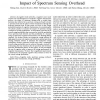Free Online Productivity Tools
i2Speak
i2Symbol
i2OCR
iTex2Img
iWeb2Print
iWeb2Shot
i2Type
iPdf2Split
iPdf2Merge
i2Bopomofo
i2Arabic
i2Style
i2Image
i2PDF
iLatex2Rtf
Sci2ools
130
Voted
TWC
2010
2010
Outage Probability Analysis of Cognitive Transmissions: Impact of Spectrum Sensing Overhead
In cognitive radio networks, a cognitive source node requires two essential phases to complete a cognitive transmission process: the phase of spectrum sensing with a certain time duration (also referred to as spectrum sensing overhead) to detect a spectrum hole and the phase of data transmission through the detected spectrum hole. In this paper, we focus on the outage probability analysis of cognitive transmissions by considering the two phases jointly to examine the impact of spectrum sensing overhead on system performance. A closed-form expression of an overall outage probability that accounts for both the probability of no spectrum hole detected and the probability of a channel outage is derived for cognitive transmissions over Rayleigh fading channels. We further conduct an asymptotic outage analysis in high signal-to-noise ratio regions and obtain an optimal spectrum sensing overhead solution to minimize the asymptotic outage probability. Besides, numerical results show that a min...
Related Content
| Added | 23 May 2011 |
| Updated | 23 May 2011 |
| Type | Journal |
| Year | 2010 |
| Where | TWC |
| Authors | YuLong Zou, Yu-Dong Yao, Baoyu Zheng |
Comments (0)

